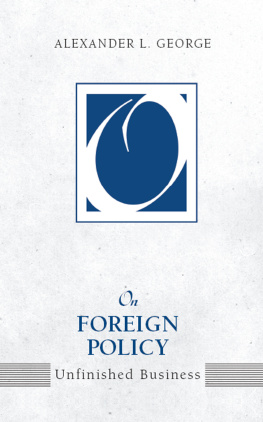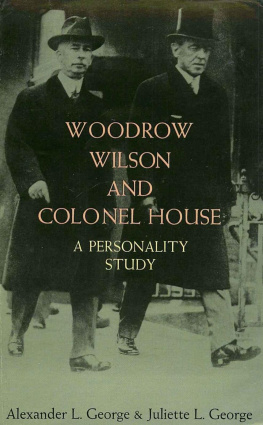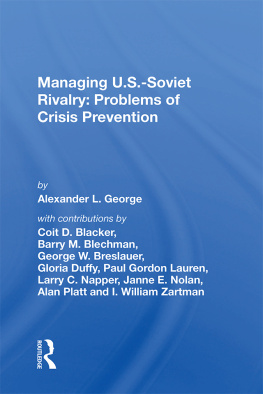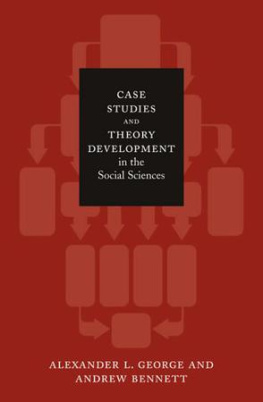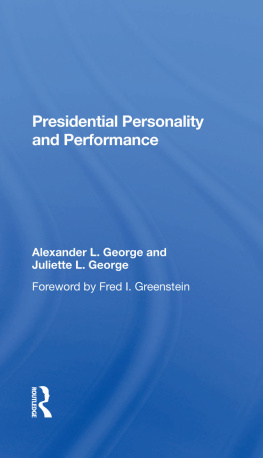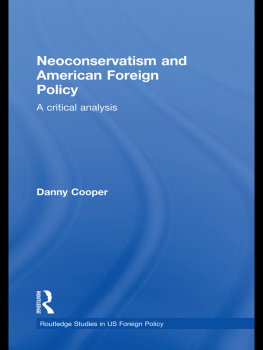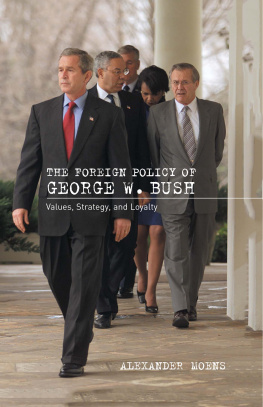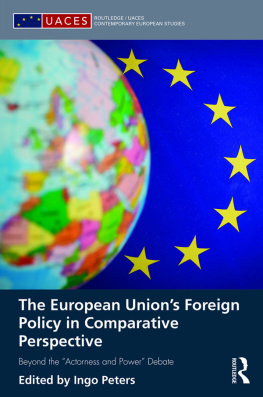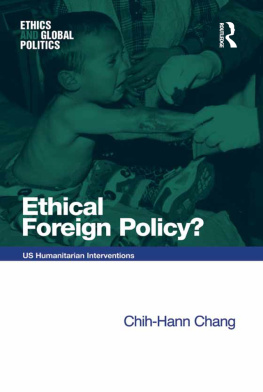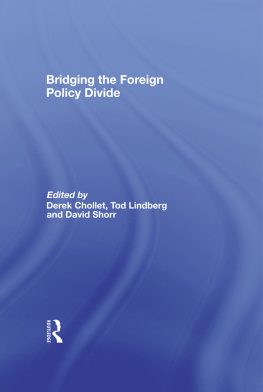
ON FOREIGN POLICY
ON POLITICS
L. Sandy Maisel, Series Editor
On Politics is a new series of short reflections by major scholars on key subfields within political science. Books in the series are personal and practical as well as informed by years of scholarship and deliberation. General readers who want a considered overview of a field as well as students who need a launching platform for new research will find these books a good place to start. Designed for personal libraries as well as student backpacks, these smart books are small format, easy reading, aesthetically pleasing, and affordable.
Books in the Series
On Foreign Policy, Alexander L. George
On Thinking Institutionally, Hugh Heclo
ALEXANDER L. GEORGE

ON FOREIGN POLICY
Unfinished Business

First published 2006 by Paradigm Publishers
Published 2016 by Routledge
2 Park Square, Milton Park, Abingdon, Oxon OX14 4RN
711 Third Avenue, New York, NY 10017, USA
Routledge is an imprint of the Taylor & Francis Group, an informa business
Copyright 2006 Alexander L. George
All rights reserved. No part of this book may be reprinted or reproduced or utilised in any form or by any electronic, mechanical, or other means, now known or hereafter invented, including photocopying and recording, or in any information storage or retrieval system, without permission in writing from the publishers.
Notice:
Product or corporate names may be trademarks or registered trademarks, and are used only for identification and explanation without intent to infringe.
Library of Congress Cataloging-in-Publication Data
George, Alexander L.
On foreign policy : unfinished business / Alexander L. George.
p. cm. (On politics)
Includes bibliographical references and index.
ISBN 13: 978-1-59451-263-6 (hc)ISBN 13: 978-1-59451-264-3 (pbk)
ISBN 1-59451-263-9 (hc : acid-free paper) ISBN 1-59451-264-7 (pbk : acid-free paper) 1. International relations. 2. International relationsDecision making. 3. United StatesForeign relations. 4. United StatesForeign relationsDecision making. I. Title. II. Series.
JZ1253.G46 2006
327.1dc22
2006001596
Designed and Typeset by Hoffman-Paulson Associates
ISBN 13: 9781594512636 (hbk)
ISBN 13: 9781594512643 (pbk)
CONTENTS
I have been perplexed by a number of important puzzles and gaps in studying foreign policy during the course of my career. I have still not been able to deal with them and as I approach the end of my professional career at the age of 85 I hope it is appropriate to write about them in this short book. What better subtitle for it than Unfinished Business!
Certainly other scholars have experienced similar or other puzzles and gaps. I hope they, too, will want to share their unfinished business with the community of scholars. Publications on international relations and foreign policy do indeed contain evidence of many important disagreements among scholars. But typically what we report in our journals deals mainly with what we, and hopefully others, consider to be progress in developing knowledge and theories. Perhaps too seldom do our journals invite or publish articles that focus instead on important puzzles and gaps. Would editors and those they consult be willing to devote an occasional issue to accounts that focus on puzzles and gaps?
Writing this brief book has provided an opportunity to discuss some of my unfinished business. But the reader should not expect that the puzzles and gaps discussed in its six chapters will be resolved. They remain, and I hope that others who read this book will be encouraged to address them more effectively than I have been able to do.
What remains in the brief preview of the chapters that follow is to provide some thoughts as to how these puzzles and gaps might be better understood and pursued more effectively.
The reader will note that some of these chapters focus on important conceptual issues. Some key concepts in foreign policy research remain unresolved within the profession; others remain ambiguous or are controversially defined. Several chapters discuss conceptual problems that, ideally, should be resolved before the concepts are converted into variables for detailed research, the various results of which make comparison and cumulation of findings difficult, if not impossible. These concepts, as will be noted, have to do with ideology, national interest, policymakers judgments, and peace.
attempts to clarify the concepts of ideology, national interest, and national values. It offers a somewhat novel interpretation of relations among these concepts, challenging some existing formulations. Important questions are left for further study.
addresses this question, introducing the concept of policy legitimacy. A detailed case study is provided that illustrates the relevance of policy legitimacy, which Franklin D. Roosevelt failed to achieve in pursuing his concept of a postWorld War II international system. As a result, Roosevelt was forced to settle for a United Nations, which he did not favor.
Writers in the burgeoning literature on democratic peace have come to recognize the need to identify different subtypes of peace. But there is disagreement on the most appropriate subtypes of peace that can contribute to developing sound causal theories. offers a different set of subtypes of peaceprecarious peace, conditional peace, and stable peace. This chapter also presents the argument that democratic peace is in fact a subtype of stable peace, one that emerges in relations between states that are not democracies or when only one state is a democracy. Taking stable peace into account may facilitate progress in research on democratic peace.
A major gap in foreign policy analysis is the failure to identify the various types of judgment that leaders presumably find it necessary to make in choosing foreign . Only the first is discussed; the other six types remain to be addressed.
The revival of interest in the possible uses of counterfactual analysiswhat has often been referred to in the past as mental experimentsis addressed and evaluated in . Important requirements for acceptable counterfactual analysis are identified. Under what conditions, then, is rigorous counterfactual analysis a serviceable method? This chapter contributes an answer to this question by providing a case study of inadequate use of counterfactual analysis to support the view that President Woodrow Wilsons stroke in October 1919 explains his gross failure to compromise, as he should have, in order to secure Senate acceptance of the League of Nations.
Another major gap in foreign policy studies is the failure thus far to address the question of how to prevent genocide. Drawing on current, as-yet-unpublished research on this question, discusses the importance of improving the quality and timeliness of early warning of genocide. It also discusses the need to develop better organization of warning-response systems to facilitate policy responses before genocide occurs.
Alexander L. George

For any hopeful advocate of social science a dip in the cold and murky waters of the literature on ideology is a shocking and disillusioning experience. Few concepts in social analysis have inspired such a flood of commentaries, yet few have stimulated the production of so little cumulative knowledge about society and politics.
Next page
